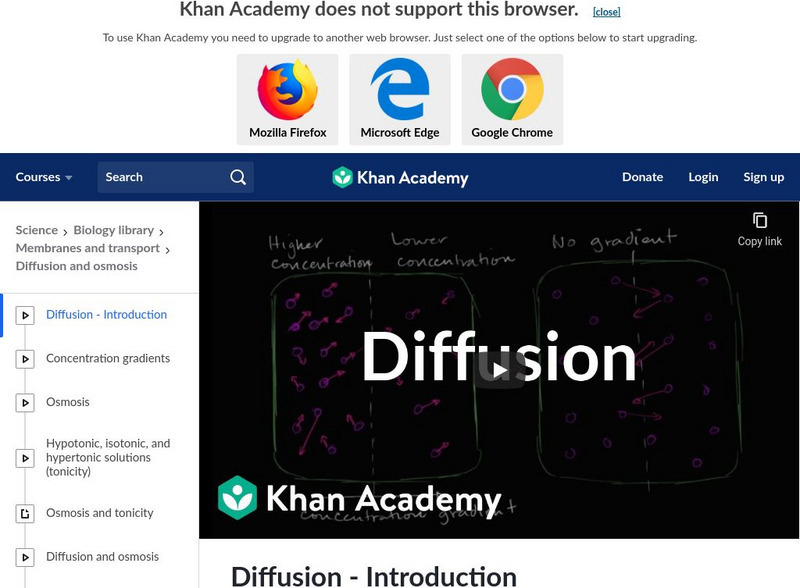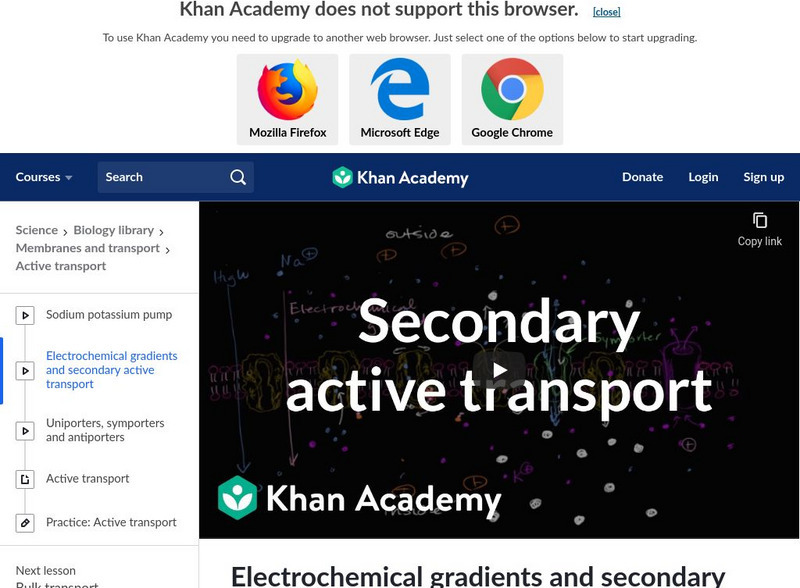TED-Ed
The Motion of the Ocean
What drives the ocean's motion? Get your class moving toward understanding by using this video. Viewers find that thermohaline circulation is caused by the concentration gradients of temperature and salinity. Using adorable animation in...
Khan Academy
Correction to Sodium-Potassium Pump Video, Health and Medicine
This is a brief correction to the video detailing the pumping of three sodium ions and two potassium ions. There is also a letter from a professor providing information about the ratio of three to two ions and explaining that the...
Veritasium
Why Do These Liquids Look Alive?
Watch as colored water droplets chase each other around a slide. The factor that affects the behavior is the concentration. Part of a large playlist, an experimental video provides an explanation for the behavior of the water droplets in...
Teacher's Pet
Gas Mixtures and Movements
Why do balloons go flat over time? The answer lies in the behavior of gases! Introduce young scientists to diffusion and effusion with a video. Pupils learn the composition and partial pressures of atmospheric gases as well as how the...
Fuse School
Diffusion of Gases
Phew, what's that smell? And, how does something like a scent travel from its source to all corners of a room? Science sleuths learn how diffusion is responsible for spreading odors around in the sixth installment in a 14-part video...
Crash Course
Passing Gases: Effusion, Diffusion and the Velocity of a Gas
We know that gases move throughout and out of our bodies, but why? And how? Learn about gas movement by analyzing rates of effusion. Additionally, watch an interesting precipitate reaction using gases to apply effusion, diffusion, and...
Khan Academy
Khan Academy: Diffusion
A video lecture exploring diffusion. Understand how a concentration gradient causes molecules to move from an area of high concentration to low concentration without any energy expended. [6:07]
Khan Academy
Khan Academy: Facilitated Diffusion
Video tutorial helps with understanding how channel proteins and carrier proteins can facilitate diffusion across a cell membrane (passive transport). [6:34]
Khan Academy
Khan Academy: Electrochemical Gradients and Secondary Active Transport
This video tutorial provides students with an understanding of how a cell can use a molecule's electrochemical gradient to power secondary active transport. [5:16]
Khan Academy
Khan Academy: Uniporters, Symporters and Antiporters
Video tutorial presents a review of various forms of passive and active transport. [7:12]
Sophia Learning
Sophia: Diffusion: Lesson 5
This lesson will explain how substances move across a cell membrane through the process of diffusion as well as discuss why this process is important in our bodies. It is 5 of 8 in the series titled "Diffusion."
Khan Academy
Khan Academy: New Topic: Membrane Potentials Part 2
Find out how a cell that is permeable to one ion can become charged (either positive or negative) if there is permeability and a concentration gradient in this video lecture. Also discussed is an equation to calculate the membrane...
Khan Academy
Khan Academy: New Topic: Membrane Potentials Part 1
Find out how a cell that is permeable to one ion can become charged (either positive or negative) if there is permeability and a concentration gradient. Rishi is a pediatric infectious disease physician and works at Khan Academy. [8:21]
Sophia Learning
Sophia: Cell Membrane Transport Processes Diffusion
A narrated, video tutorial illustrating how diffusion works. It shows the concentration gradient that diffusion follows, explains the difference between diffusion and facilitated diffusion, and presents real life examples. [7:46]
Sophia Learning
Sophia: Facilitated Diffusion
A video presentation describing how transport proteins in the cell membrane allow solutes to cross the cell membrane without the use of cellular energy. [5:41]
Khan Academy
Khan Academy: Sodium Potassium Pump
This video explains how the sodium-potassium (Na+/K+) pump works and its role in establishing resting membrane potentials. [7:18]
Khan Academy
Khan Academy: Sodium Potassium Pump
This video explains how a sodium-potassium pump can maintain a voltage gradient across a cell or neuron's membrane. The sodium-potassium pump goes through cycles of shape changes to help maintain a negative membrane potential. [13:52]
Khan Academy
Khan Academy: Uniporters, Symporters and Antiporters
Uniporters, symporters, and antiporters are proteins that are used in the transport of substances across a cell membrane. This video describes how each of these works in the transport process. [7:13]
Sophia Learning
Sophia: Diffusion: Lesson 3
This lesson explains the process of diffusion. It explains how diffusion is a passive form of transport, used to move molecules down their concentration gradient. It is 3 of 8 in the series titled "Diffusion."
Sophia Learning
Sophia: Osmosis: Lesson 3
This lesson explains the process of osmosis. It explains how osmosis is a passive form of transport, used to move water molecules across a semi-permeable membrane, down their concentration gradient. It is 3 of 8 in the series titled...
Sophia Learning
Sophia: Active Transport: Lesson 3
This lesson introduces the process of active transport, explaining that it is a form of transport that requires energy, and moves molecules against their concentration gradient. It is 3 of 4 in the series titled "Active Transport."





















